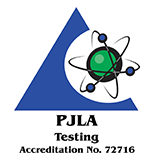Background: Gluten is the main group of proteins in grains and consists of prolamins (in wheat: gliadin) and glutelins (in wheat: glutenins) occurring in the same ratio. Due to its physicochemical characteristics, gluten is used in food products as a binder. Coeliac disease is an autoimmune disorder of the small intestine. It is caused by a reaction to gliadin and the only effective treatment is a lifelong gluten-free diet. Due to Codex Standard 118-1979, “gluten-free” products must comply with gluten levels (including prolamin fractions from wheat, rye, barley and oats) below 20 mg/kg (ppm) and “foods specially processed to reduce gluten content” must comply with levels between 20 and 100 mg/kg (ppm).
This analysis is intended to confirm the absence of Gluten in food, rinse waters and swab samples.
Method
Apparatus
Turn Around Time
Sample Required – Product Samples
Sample Required – Rinse Water
Sample Required – Swab Samples
Type of Test
Reportable Units
Detection Limit – Product Samples
Detection Limit – Rinse Water
Detection Limit – Swab Samples
AOAC 061403 Romer Labs AgraStrip Gluten G12
Romer Labs AgraStrip
Same Day for Swabs or 5-10 Business Days for Product
0.2 grams of a representative sample
0.5 mL Rinse Water
5cm x 5cm (25 cm2) or 10cm x 10 cm (100 cm2)
Lateral Flow Device; Test Strip
Product: ppm = mg/L or Swabs: µg/cm2
Lower Detection Limit: 5, 10, or 20 ppm Gluten
Lower Detection Limit: 0.35 ppm (35 ppb) Gluten
Lower Detection Limit: 4 µg/25 cm2 or 1 µg/100 cm2 Gluten
Analysis Description: Immunological rapid test in lateral flow format for the detection of Gluten in food, rinse waters and swab samples (environmental samples). The test kit uses a new monoclonal antibody called G12 that specifically recognizes the pathogenic fragment of the gliadin protein present in gluten. This fragment is called 33-mer and triggers the auto-immune reaction in coeliac patients. The extracted sample is transferred to an incubation vial that contains specific ready-to-use antibodies. During the test, if the sampel contains Gluten, the sample reacts with a coloured conjugate (anti-gliadin 33mer monoclonal antibody-red-coloured microsphere) which forms a complex with the reagent on the strip. This complex spreads along the membrane by capillary action and is therefore detected by the test strip.
Notes: This assay is not appropriate for food products which are known to contain Gluten. If the sample contains more than 1% (10,000 ppm) Casein, the assay will be overwhelmed and give a false-negative result.
Sampling: Consideration must be taken that the food may contain an uneven distribution of Gluten (spot contamination). It is important to provide a representative portion of food as only a small amount of material is tested.


